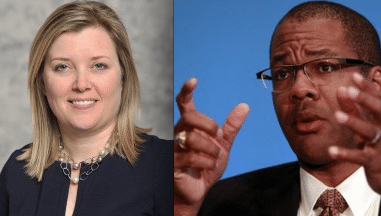This is a guest post by Lee Fang originally published at Republic Report.
Expanded natural gas exports have wide repercussions, ranging from increased costs to American consumers to greater incentives for drilling companies to use controversial fracking methods for extracting their product. As numerous reports have shown, the gas boom means more methane, a greenhouse gas that is exacerbating our climate crisis, in the atmosphere.
But the discussion in Washington has not focused on the climate and environmental impact of rapidly approving LNG export licenses, a process controlled by the Federal Energy Regulatory Commission and the Department of Energy. Instead, as Republic Report’s David Halperin outlined last week, companies that stand to gain from building new terminals and engaging in the gas trade have hired an army of lobbyists to win regulatory approval. Heather Zichal, the former climate change adviser to the White House, recently left her government position to join the board of Cheniere, an LNG export company that won the first export license. As DeSmogBlog’s Steve Horn reported, Zichal met with Cheniere executives last year.
How fair will the process be when the former regulators who until recently controlled the agencies at the center of the LNG debate are now working for industry, and the regulators in office are former industry staffers?
Republic Report worked with LittleSis to produce the following maps showing the nexus of influence. At the Department of Energy, for example, acting Assistant Secretary for Fossil Enerrgy Christopher Smith, who now oversees the LNG export license process, formerly worked for Chevron’s natural gas trading unit. Paula Gant, the Deputy Assistant Secretary for Oil and Natural Gas who works under Smith, is a former vice president at the American Gas Association, a lobbying group for the industry. See below:
For industry, a number of former FERC commissioners now work either directly for natural gas companies seeking export licenses, or for their law-lobbying firms. One example is billionaire George Kaiser, whose company Excelerate Energy is seeking to win approval for the first floating LNG export terminal off of the coast of Texas. Registration disclosures show Kaiser has retained the services of Akin Gump Strauss Hauer & Feld LLP, a prominent law and lobbying firm that counts former FERC commissioner Suedeen Kelly as a partner. Kelly also joined the board of Chesapeake Midstream Partners, a natural gas pipeline firm. See below:
Image caption: Paula Gant previously worked for the American Gas Association and Christopher Smith previously worked for Chevron’s liquified natural gas trading unit. Now, both work for the Department of Energy’s unit overseeing LNG applications.
Subscribe to our newsletter
Stay up to date with DeSmog news and alerts






